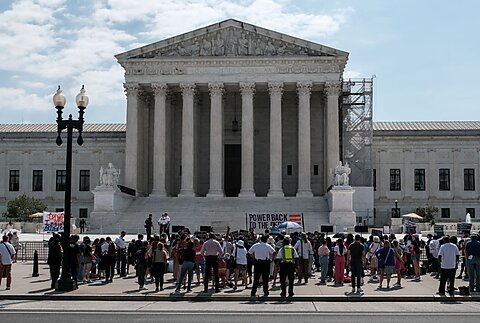On June 28, the Supreme Court’s Loper Bright decision overruled the 40‐year‐old Chevron doctrine. My immediate reaction to the decision is here, and I discuss the case on the Cato Daily Podcast here. Law Professors Christopher Walker and Ilya Somin have also written thoughtful summaries and analyses of the majority opinion by Chief Justice John Roberts, the dissenting opinion by Justice Elena Kagan, and the concurrences by Justices Clarence Thomas and Neil Gorsuch.
In this post, I’ll address one claim in the dissent that has received particular attention: the claim that overruling Chevron will move policy decisions to the politically unaccountable judicial branch.
First, a quick recap of the (now overruled) Chevron doctrine. In Chevron v. NRDC (1984), the Supreme Court announced a new “two‐step” framework for resolving disputes over the scope of an agency’s statutory authority. Under this standard, a court must first consider “the question whether Congress has directly spoken to the precise question at issue.” This first question should be “the end of the matter” if “the intent of Congress is clear,” because courts “must give effect to the unambiguously expressed intent of Congress.” At this stage, courts must employ “the traditional tools of statutory construction” to ascertain whether “Congress had an intention on the precise question at issue.”
It was the second step that would make Chevron a landmark case. If a court finds that “Congress has not directly addressed the precise question at issue,” then under Chevron the agency’s interpretation can become determinative. In this situation, Chevron instructed that a court should “not simply impose its own construction on the statute, as would be necessary in the absence of an administrative interpretation.” Instead, courts should ask “whether the agency’s answer is based on a permissible construction of the statute.” If the answer is yes, Chevron required that the court defer to the agency’s interpretation.
It is this second step that Loper Bright eliminated. The premise underlying Loper Bright is that the second Chevron step is incoherent because there is always a single best reading of a statute. “In an agency case as in any other, … there is a best reading all the same—‘the reading the court would have reached’ if no agency were involved.” As the majority put it, “statutes, no matter how impenetrable, do—in fact, must—have a single, best meaning.” And if that is so, then it “makes no sense to speak of a ‘permissible’ interpretation that is not the one the court, after applying all relevant interpretive tools, concludes is best. In the business of statutory interpretation, if it is not the best, it is not permissible.”
Throughout the Loper Bright majority opinion, the court reiterated that Chevron was about who decides legal questions, not policy questions. “It is reasonable to assume that Congress intends to leave policymaking to political actors. But resolution of statutory ambiguities involves legal interpretation.” The majority opinion reassured readers that overruling Chevron will not change how courts review those statutes that do delegate policymaking decisions to agencies. “[S]ome statutes ‘expressly delegate[]’ to an agency the authority to give meaning to a particular statutory term. … Others empower an agency to prescribe rules to ‘fill up the details’ of a statutory scheme … or to regulate subject to the limits imposed by a term or phrase that ‘leaves agencies with flexibility,’ … such as ‘appropriate’ or ‘reasonable.’” In those situations, the opinion instructs courts to “effectuate the will of Congress … by recognizing constitutional delegations,” just as they have before.
Justice Kagan’s dissent rejected the majority’s premise that the types of questions decided under Chevron have only one best answer. In Kagan’s view, it is often the case that “a statutory phrase has more than one reasonable reading. And Congress has not chosen among them: It has not, in any real‐world sense, ‘fixed’ the ‘single, best meaning’ at ‘the time of enactment.’”
Kagan’s dissent argued that Chevron deference “rests on a presumption about legislative intent.” As she put it, Congress “knows that [regulatory] statutes will inevitably contain ambiguities that some other actor will have to resolve, and gaps that some other actor will have to fill. And it would usually prefer that actor to be the responsible agency, not a court.”
The majority’s implicit response to this criticism is that Congress may always draft any individual statute so that its “best reading … is that it delegates discretionary authority to an agency.” Or, if Congress disagrees with the policy that results from a court’s interpretation, it is “always free to act by revising the statute.”
Put another way, the court’s opinion in Loper Bright set no limitations on Congress’s ability to explicitly delegate policy choices to the Executive Branch (the extent to which such delegations may be limited by the Nondelegation Doctrine is a question for another case). Loper Bright was not about cases where a statute has delegated authority to an agency to choose the most “reasonable” public policy. Instead, Loper Bright was about those cases where the Executive Branch was previously allowed to decide quintessentially legal questions like what a word or phrase meant at the time of a statute’s enactment. It is those types of questions that should be answered by courts, not agencies. “By forcing courts to … pretend that ambiguities are necessarily delegations, Chevron [did] not prevent judges from making policy. It prevent[ed] them from judging.”















